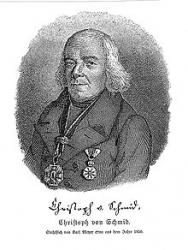Planning worship?
Check out our sister site, ZeteoSearch.org,
for 20+ additional resources related to your search.
- |
User Links
Search Results
O come, little children, from cot and from hall
Appears in 3 hymnals Used With Tune: [O come, little children, from cot and from hall] Text Sources: German Folk Song
O come, little children, from cot and from hall
[O come, little children, from cot and from hall]
Appears in 88 hymnals Composer and/or Arranger: Johann A. P. Schulz Incipit: 55355 35424 35535 Used With Text: O come, little children, from cot and from hall
[O come, little children, from cot and from hall]
O come, little children, from cot and from hall
Hymnal: A Treasury of Hymns #109 (1953) Languages: English Tune Title: [O come, little children, from cot and from hall]
O come, little children, from cot and from hall
O Come, Little Children
Hymnal: The Children's Hymnal #90 (1918) First Line: O come, little children, from cot and from hall Languages: English Tune Title: [O come, little children, from cot and from hall]
O Come, Little Children
O come, little children, from cot and from hall
Hymnal: The Children's Hymnal and Service Book #12 (1929) Languages: English Tune Title: IHR KINDERLEIN, KOMMET
O come, little children, from cot and from hall
Christoph von Schmid

1768 - 1854 Person Name: J. C. von Schmid Author of "O come, little children, from cot and from hall" Johann Christoph von Schmidt DT Germany 1768-1854. Born at Dinkelsbuhl, Bavaria, Germany, the oldest of nine children and son of a civil servant who worked for the Teutonic Order, he received private lessons in the monastery and attended Catholic Latin school for two years, then attended the Dillingen high school, afterward tutoring for a wealthy family. He enrolled in the Episcopal University in Dillingen and studied philosphy for two years, then theology for four years. He was ordained a Roman Catholic priest in 1791. He served as parish vicar in Nassenbeuren, then chaplain at Seeg. In 1796, when he was placed as the head of a large school in Thannhausen, where he taught for many years. From 1816-1826 he was parish priest at Oberstadion in Wurttemberg. In 1826 he was appointed Canon of the Augsburg Cathedral. In 1832 he was administrator for the school system for Swabia and Neuburg. In 1837 he was raised by Bavarian King Ludwig I to personal nobility, a knight of the Order of Merit of the Bavarian Crown. In old age he received numerous honors, and his 80th birthday was a public holiday in Augsburg. The University of Prague awarded him the title of Doctor of Theology. In addition to being an educator, he was also a prolific author and writer of children’s stories. He would often read his stories to the school children after classes. His stories became very popular and were translated into 24 languages. His general theme in story writing was to awaken a practical piety in children. Wrote 40 story books for children. He also wrote poetry. His most famous work: “A basket of flowers”. He died of cholera at Augsburg, Germany. In 1857 his autobiography was published.
John Perry
Christoph von Schmid
J. A. P. Schulz

1747 - 1800 Person Name: Johann A. P. Schulz (1747-1800) Composer of "IHR KINDERLEIN, KOMMET" in The Children's Hymnal and Service Book Johann Abraham Peter Schulz Germany 1747-1800. Born at Luneburg, Germany, son of a baker, he attended St Michaelis school in Luneburg and studied organ, then the Johanneum from 1759-1764. In 1765 he was a student of composer, Johann Kimberger, and then taught in Berlin himself. In 1768 Kimberger recommended Schulz for the position of music teacher and accompanist to the Polish Princess Sapieha Woiwodin von Smolensk. Schulz moved to Berlin and traveled with her for three years performing throughout Europe, where he came in contact with many new musical ideas. He married Catharina Maria Gercken, and they had a daughter, Celle. He served as the conductor of the French Theatre in Berlin from 1776-1780. From 1786-1787 he was the Kapellmeister of Prince Henry in Rheinsberg. He began writing operas in 1785 and became musical director of the Berlin French theatre. Schulz went on to serve as Court Kapellmeister in Copenhagen from 1787-1795 before returning to Berlin. In Copenhagen the music library burned down, and he had a breakdown in health from trying to save it. His health suffered further from the effects of a shipwreck he experienced in 1796. Schulz wrote seven operas, stage music, oratorios, and cantatas, as well as piano pieces, folk songs, and church music. He also wrote articles on music theory for Johann Georg Sulzer’s ‘Allgemeine Theorie der schonen Kunste’ in four volumes. He died at Schwedt an der Oder, Germany.
John Perry
J. A. P. Schulz


 My Starred Hymns
My Starred Hymns


